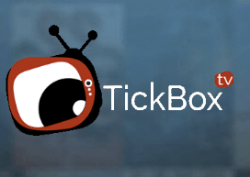 Georgia-based TickBox TV is a provider of set-top boxes that allow users to stream all kinds of popular content. Like other similar devices, Tickboxes use the popular Kodi media player alongside instructions how to find and use third-party addons.
Georgia-based TickBox TV is a provider of set-top boxes that allow users to stream all kinds of popular content. Like other similar devices, Tickboxes use the popular Kodi media player alongside instructions how to find and use third-party addons.
Of course, these types of add-ons are considered a thorn in the side of the entertainment industries and as a result, Tickbox found itself on the receiving end of a lawsuit in the United States.
Filed in a California federal court in October, Universal, Columbia Pictures, Disney, 20th Century Fox, Paramount Pictures, Warner Bros, Amazon, and Netflix accused Tickbox of inducing and contributing to copyright infringement.
“TickBox sells ‘TickBox TV,’ a computer hardware device that TickBox urges its customers to use as a tool for the mass infringement of Plaintiffs’ copyrighted motion pictures and television shows,” the complaint reads.
“TickBox promotes the use of TickBox TV for overwhelmingly, if not exclusively, infringing purposes, and that is how its customers use TickBox TV. TickBox advertises TickBox TV as a substitute for authorized and legitimate distribution channels such as cable television or video-on-demand services like Amazon Prime and Netflix.”
The copyright holders reference a TickBox TV video which informs customers how to install ‘themes’, more commonly known as ‘builds’. These ‘builds’ are custom Kodi-setups which contain many popular add-ons that specialize in supplying pirate content. Is that illegal? TickBox TV believes not.
In a response filed yesterday, TickBox underlined its position that its device is not sold with any unauthorized or illegal content and complains that just because users may choose to download and install third-party programs through which they can search for and view unauthorized content, that’s not its fault. It goes on to attack the lawsuit on several fronts.
TickBox argues that plaintiffs’ claims, that TickBox can be held secondarily liable under the theory of contributory infringement or inducement liability as described in the famous Grokster and isoHunt cases, is unlikely to succeed. TickBox says the studios need to show four elements – distribution of a device or product, acts of infringement by users of Tickbox, an object of promoting its use to infringe copyright, and causation.
“Plaintiffs have failed to establish any of these four elements,” TickBox’s lawyers write.
Firstly, TickBox says that while its device can be programmed to infringe, it’s the third party software (the builds/themes containing addons) that do all the dirty work, and TickBox has nothing to do with them.
“The Motion spends a great deal of time describing these third-party ‘Themes’ and how they operate to search for and stream videos. But the ‘Themes’ on which Plaintiffs so heavily focus are not the [TickBox], and they have absolutely nothing to do with Defendant. Rather, they are third-party modifications of the open-source media player software [Kodi] which the Box utilizes,” the response reads.
TickBox says its device is merely a small computer, not unlike a smartphone or tablet. Indeed, when it comes to running the ‘pirate’ builds listed in the lawsuit, a device supplied by one of the plaintiffs can accomplish the same task.
“Plaintiffs have identified certain of these thirdparty ‘builds’ or ‘Themes’ which are available on the internet and which can be downloaded by users to view content streamed by third-party websites; however, this same software can be installed on many different types of devices, even one distributed by affiliates of Plaintiff Amazon Content Services, LLC,” the company adds.
Referencing the Grokster case, TickBox states that particular company was held liable for distributing a device (the Grokster software) “with the object of promoting its use to infringe copyright.” In the isoHunt case, it argues that the provision of torrent files satisfied the first element of inducement liability.
“In contrast, Defendant’s product – the Box – is not software through which users can access unauthorized content, as in Grokster, or even a necessary component of accessing unauthorized content, as in Fung [isoHunt],” TickBox writes.
“Defendant offers a computer, onto which users can voluntarily install legitimate or illegitimate software. The product about which Plaintiffs complain is third-party software which can be downloaded onto a myriad of devices, and which Defendant neither created nor supplies.”
From defending itself, TickBox switches track to highlight weaknesses in the studios’ case against users of its TickBox device. The company states that the plaintiffs have not presented any evidence that buyers of the TickBox streaming unit have actually accessed any copyrighted material.
Interestingly, however, the company also notes that even if people had streamed ‘pirate’ content, that might not constitute infringement.
First up, the company notes that there are no allegations that anyone – from TickBox itself to TickBox device owners – ever violated the plaintiffs’ exclusive right to perform its copyrighted works.
TickBox then further argues that copyright law does not impose liability for viewing streaming content, stating that an infringer is one who violates any of the exclusive rights of the copyright holder, in this case, the right to “perform the copyrighted work publicly.”
“Plaintiffs do not allege that Defendant, Defendant’s product, or the users of Defendant’s product ‘transmit or otherwise communicate a performance’ to the public; instead, Plaintiffs allege that users view streaming material on the Box.
“It is clear precedent [Perfect 10 v Google] in this Circuit that merely viewing copyrighted material online, without downloading, copying, or retransmitting such material, is not actionable.”
Taking this argument to its logical conclusion, TickBox insists that if its users aren’t infringing copyright, it’s impossible to argue that TickBox induced its customers to violate the plaintiffs’ rights. In that respect, plaintiffs’ complaints that TickBox failed to develop “filtering tools” to diminish its customers’ infringing activity are moot, since in TickBox’s eyes no infringement took place.
TickBox also argues that unlike in Grokster, where the defendant profited when users’ accessed infringing content, it does not. And, just to underline the earlier point, it claims that its place in the market is not to compete with entertainment companies, it’s actually to compete with devices such as Amazon’s Firestick – another similar Android-powered device.
Finally, TickBox notes that it has zero connection with any third-party sites that transmit copyrighted works in violation of the plaintiffs’ rights.
“Plaintiff has not alleged any element of contributory infringement vis-à-vis these unknown third-parties. Plaintiff has not alleged that Defendant has distributed any product to those third parties, that Defendant has committed any act which encourages those third parties’ infringement, or that any act of Defendant has, in fact, caused those third parties to infringe,” its response adds.
But even given the above defenses, TickBox says that it “voluntarily took steps” to remove links to the allegedly infringing Kodi builds from its device, following the plaintiffs’ lawsuit. It also claims to have modified its advertising and webpage “to attempt to appease Plaintiffs and resolve their complaint amicably.”
Given the above, TickBox says that the plaintiffs’ application for injunction is both vague and overly broad and would impose “imperssible hardship” on the company by effectively shutting it down while requiring it to “hack into and delete content” which TickBox users may have downloaded to their boxes.
TickBox raises some very interesting points around some obvious weaknesses so it will be intriguing to see how the Court handles its claims and what effect that has on the market for these devices in the US. In particular, the thorny issue of how they are advertised and promoted, which is nearly always the final stumbling block.
—
A copy of Tickbox’s response is available here (pdf), via Variety
Source: TF, for the latest info on copyright, file-sharing, torrent sites and more. We also have VPN discounts, offers and coupons

 If you enjoy this episode, consider becoming a patron and getting involved with the show. Check out Steal This Show’s Patreon campaign: support us and get all kinds of fantastic benefits!
If you enjoy this episode, consider becoming a patron and getting involved with the show. Check out Steal This Show’s Patreon campaign: support us and get all kinds of fantastic benefits! The
The  Georgia-based TickBox TV is a provider of set-top boxes that allow users to stream all kinds of popular content. Like other similar devices, Tickboxes use the popular Kodi media player alongside instructions how to find and use third-party addons.
Georgia-based TickBox TV is a provider of set-top boxes that allow users to stream all kinds of popular content. Like other similar devices, Tickboxes use the popular Kodi media player alongside instructions how to find and use third-party addons. The major movie studios are doing everything in their power to stop the public from copying films.
The major movie studios are doing everything in their power to stop the public from copying films. 